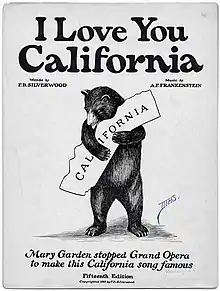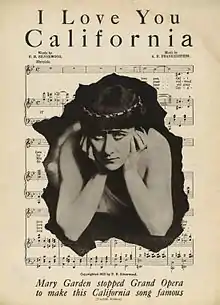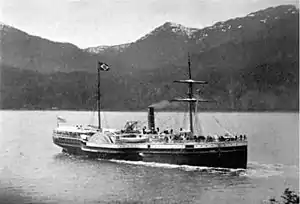I Love You, California
"I Love You, California" is the regional anthem of the U.S. state of California, originally published in 1913. It was adopted in 1951 and reconfirmed in 1987 as the official state song.
 | |
Regional anthem of | |
| Lyrics | Francis Beatty Silverwood, 1913 |
|---|---|
| Music | Abraham Franklin Frankenstein, 1913 |
| Published | 1913 |
| Adopted | April 26, 1951 |
| Readopted | 1987 |
| Audio sample | |
"I Love You, California" (instrumental)
| |
The lyrics were written by Francis Beatty Silverwood (1863–1924), a Los Angeles clothier,[1][2] and the words were subsequently put to music by Abraham Franklin Frankenstein (1873–1934),[3] then conductor of the Orpheum Theatre Orchestra,[4] with an inaugural performance by Mary Garden. Frankenstein was a cousin of the San Francisco Chronicle's long-time music and art critic Alfred V. Frankenstein.[5] The song was published by Hatch & Loveland, Music Printers, Los Angeles, California,[6] and copyrighted by F.B. Silverwood in 1913. It was the official song of expositions held in San Francisco and San Diego in 1915.
History
.jpg.webp)
Premiere

Later in 1913, the song was introduced by opera star Mary Garden, associated with the Chicago Grand Opera at that time. "Mary Garden stopped Grand Opera to make this California song famous," read the notices virtually ensuring the popularity and success of the new song. The renowned soprano wrote on stationery from the Hotel Alexandria in Los Angeles:
Dear Mr. Silverwood: I am proud to be the first to sing your most beautiful song in public — and I hope for it a wonderful success here in California and everywhere! Sincerely, Mary Garden
Played aboard the SS Ancon

"I Love You, California" was played aboard the steamship Ancon, which on August 14, 1914, became the first merchant ship to pass through the Panama Canal.
State legislative designation
In 1951, the State Legislature passed a resolution designating it as California's state song. California Government Code section 421.7 states, "I Love You, California", a song published in 1913 with lyrics by F.B. Silverwood and music by A.F. Frankenstein, is an official state song."[7]
In 1987, "I Love You, California" became the official state song by law.[8]
Official use
"I Love You, California" is played at funerals of Californian governors, most recently at the funeral of Ronald Reagan.
At the inauguration of Ronald Reagan as the governor of California on January 2, 1967, it was sung by the University of California, Davis, All-Male Marching Band. Reagan, apparently familiar with the then little known song, quipped, "Thanks for singing a song old enough to make me feel young!", according to a personal reminiscence of a former band member.
Commercial use
In late 2012, Jeep began running a TV advertisement in California, with "I Love You, California" as the soundtrack and visuals showing the Californian state flower, Californian flag, and other Californian icons.[9]
The song also serves as the theme music for the state’s public television human interest series “California’s Golden Parks”, presented by Huell Howser.
Lyrics
I Love You, California
I.
I love you, California, you're the greatest state of all.
I love you in the winter, summer, spring and in the fall.
I love your fertile valleys; your dear mountains I adore.
I love your grand old ocean and I love her rugged shore.
Chorus
When the snow crowned Golden Sierras
Keep their watch o'er the valleys bloom,
It is there I would be in our land by the sea,
Every breeze bearing rich perfume.
It is here nature gives of her rarest. It is Home Sweet Home to me,
And I know when I die I shall breathe my last sigh
For my sunny California.
II.
I love your red-wood forests – love your fields of yellow grain.
I love your summer breezes and I love your winter rain.
I love you, land of flowers; land of honey, fruit and wine.
I love you, California; you have won this heart of mine.
III.
I love your old gray Missions – love your vineyards stretching far.
I love you, California, with your Golden Gate ajar.
I love your purple sun-sets, love your skies of azure blue.
I love you, California; I just can't help loving you.
IV.
I love you, Catalina, you are very dear to me.
I love you, Tamalpais, and I love Yosemite.
I love you, Land of Sunshine, half your beauties are untold.
I loved you in my childhood, and I'll love you when I'm old.
Other non-official state songs
During the years following, several attempts were made to make other songs the official state song. In 1921, Lynden Ellsworth Behymer (1862–1947), impresario, and Bessie Bartlett Frankel (Mrs. Cecil Frankel) (1884–1959)], donated a sum of money to the California Federation of Music Clubs to hold a contest for lyrics to a state song "of real value." The judges were Benjamin Franklin Field (1868–1960), chairman of the federation and chairman of the committee of judges, Grace Atherton Dennen (1874–1927), editor and publisher of The Lyric West,[10] and Blanche Robinson (Mrs. Martin Hennion Robinson) (née Williams; 1883–1969), composer. The original deadline, October 1, 1921, was extended to December 31, 1921 and the prize money was increased to $100.[11] The judges selected Mary Lennox of San Francisco on January 17, 1922, as the winner was "California, Sweet Homeland of Mine":
You're the land at the foot of the rainbow,
Where the great pot of treasure was spilled
That is fashioned anew by the sunshine and dew,
Into marvels of bright hopes fulfilled;
You're land where each fair trail leads homeward,
'Neath the palm of the sheltering pine
California, sweet homeland of mine.[12]
See also
References
- Vaillancourt, Ryan (2013-07-01). "Mining for Sonic Gold in the Central Library: Exhibit and Book Examine Los Angeles History Through Old Sheet Music". Los Angeles Downtown News. Retrieved 2017-08-29.
Silverwood owned a clothing company on Broadway [Los Angeles], on the same block as the Orpheum Theatre, where Frankenstein was the house orchestra's music director.
- Radio, Southern California Public (12 July 2013). "The story behind the Golden State's official song, 'I Love You California'". Southern California Public Radio.
- de Brie, Tim (July 2010). "Frankenstein, Abraham Frankum". composers-classical-music.com. Haarlem, Netherlands. Retrieved 2017-08-29.
7.mar.1873-30.nov.1934 USA Illinois, Chicago – California, Los Angeles (car accident)
- Clar, Reva (November 2002). "The Jews of Los Angeles: Urban Pioneers". Jewish Genealogical Society of Los Angeles. Archived from the original on 2018-05-29. Retrieved 2017-08-29.
The first permanent theatre orchestra in Los Angeles was organized in 1898 at the Orpheum Theatre by Abraham F. Frankenstein, who was its musical director for over thirty years. He organized bands for the Los Angeles Police and Fire Departments and the Al Malaikah Shrine Band, and in addition served on the Fire Commission of the City of Los Angeles.
- "[unknown title]". Ukiah Daily Journal. Ukiah, California. 1982-02-26. p. 5. Retrieved 2017-08-29.
Abraham F. Frankenstein was a cousin of the Chronicle's long-time music and art critic Alfred V. Frankenstein
- Hatch & Loveland was founded in 1911 by Charles Wesley Hatch (1885– ) and Charles F. Loveland
- "Government Code Section 421.7". California Government Code. State of California. Archived from the original on 28 June 2009. Retrieved 15 March 2013.
- Jepsen, Chris (February 2013). "100 Years of Loving California". County Courier. Orange County Historical Society. 43 (2): 3.
- "YouTube". www.youtube.com.
- The Lyric West (a poetry magazine, published monthly, in existence from 1921 to 1927), Los Angeles & San Francisco
- Offering Prize for State Song, Oakland Tribune, Sect B, p. 5, December 11, 1921
- Words for State Song are Chosen, Los Angeles Times, Sect III, p. 29, January 22, 1922